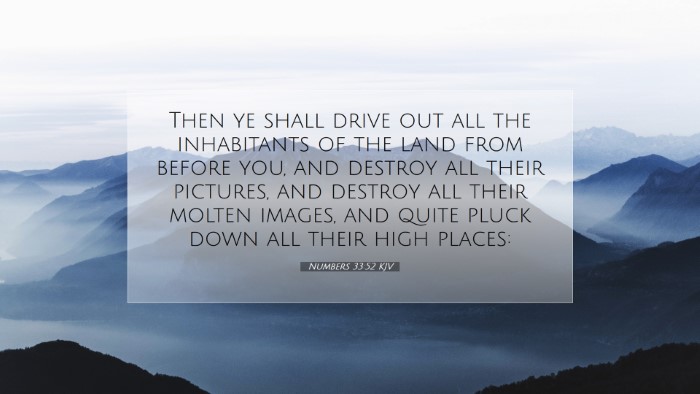Commentary on Numbers 33:52
Bible Verse: “Then drive out all the inhabitants of the land from before you, and destroy all their figured stones, and destroy all their metal images, and demolish all their high places.”
Introduction
This verse is a crucial instruction given to the Israelites as they prepare to settle in the Promised Land. It encapsulates the significant themes of holiness, separation from idolatry, and divine judgment that recur throughout the Pentateuch. Insightful commentaries reveal various dimensions of this directive, its historical context, and applications for modern believers.
Exegesis of Numbers 33:52
Historical Context: The Israelites, having completed their arduous journey through the wilderness, stand on the cusp of entering Canaan. The land is occupied by various peoples, and the command given serves both as a practical strategy for survival and a spiritual mandate.
Driving Out Inhabitants
Matthew Henry: Henry emphasizes the imperative nature of this command. The driving out of inhabitants symbolizes the complete removal of opposition to God’s plans. The text underscores that these actions were not mere recommendations but divine orders meant to secure the land for the Israelites while maintaining God’s covenantal promise.
Destruction of Idols
Albert Barnes: Barnes notes the necessity of destroying idolatrous figures, which reflects God’s demand for purity among His people. The presence of idols represents a direct challenge to the exclusivity of worship owed to Yahweh. The historical context reveals that these idols were not only objects of worship but also instruments of moral decay.
High Places
Adam Clarke: Clarke explains the significance of high places, often associated with pagan worship in ancient cultures. Their demolition not only symbolizes the rejection of false gods but also represents the establishment of God’s rightful place among His people. It stresses the theme that God desires to be worshiped in a manner prescribed by Him, devoid of syncretism.
Theological Reflections
This verse invites deep theological reflection regarding the nature of God’s holiness and the seriousness of sin. Here are some key reflections:
- The Holiness of God: God’s holiness demands absolute separation from sin and idol worship. This principle persists throughout Scripture and informs Christian ethical conduct.
- Judgment and Mercy: The command illustrates God’s judgment against idolatry but it is intertwined with His mercy—granting Israel the opportunity to inhabit a land flowing with blessings.
- Faithfulness and Obedience: The call for obedience reflects a covenant relationship, where blessings are contingent upon the Israelites' fidelity to God’s commands.
Practical Applications for Today
For contemporary believers, Numbers 33:52 offers several applications:
- Idolatry in Modern Context: The call to identify and eliminate modern 'idols'—anything that takes precedence over God in our lives—is crucial. This can range from material possessions to relationships.
- Commitment to Holiness: Just as the Israelites were called to maintain purity, Christians are likewise invited to uphold a standard of holiness in a world often contradictory to their faith.
- Engagement with Culture: Similar to the Israelites, believers today must navigate a complex cultural landscape. Engaging with culture requires discernment, ensuring that they uphold the truth of Scripture amidst competing ideologies.
Conclusion
Numbers 33:52 serves as a vivid reminder of God’s intentions for His people—those who are set apart for His glory. The insights from public domain commentaries lend depth to understanding this passage, highlighting its relevance across generations. As Christians, the challenges of idolatry and the pursuit of holiness remain pertinent, inviting continual reflection and action in our spiritual journeys.


